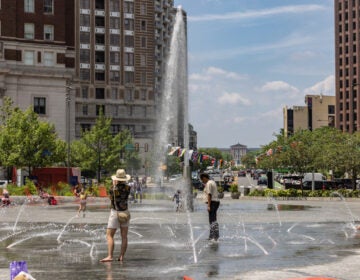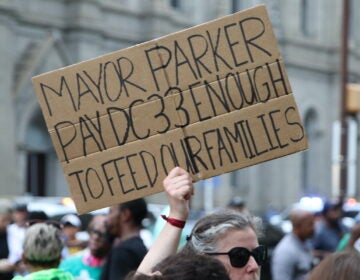Doo-wop trailblazer and Germantown native Bobby Banks reflects on his career
Hip-hop blasts from car radios and storefronts as Germantown’s business district comes to life. But inside Walt’s Barber Shop in the 5100 block of Germantown Ave., Robert “Bobby” Banks socializes with his friends and listens to a different kind of music — doo-wop, the genre he helped to popularize some 50 years ago.
“The hip-hop is okay. I just can’t get into it,” said Banks, 71, who arrived at the barber shop dressed in tan from head to toe, a gold crucifix around his neck, and sporting a fedora with a feather. “See, when I was growing up, we’d be in bowties and suits, singing about things that people understand.”
Banks, whose neighbors on Ashmeade Place in Germantown threw a party to honor him last year, played a small but important role in developing doo-wop, the vocally-based rhythm-and-blues music that grew out of the African-American communities in Philadelphia, Baltimore, New York and other cities in the 1950s and 1960s.
“I never really made it big,” Banks said during a recent interview. “Reason was, I was satisfied just being on the road … making people happy.”
Humble beginnings
Banks began his singing career when he was 12 years old and had his first recital at Germantown’s Canaan Baptist Church, one of the most influential black churches in Philadelphia. Soon, however, he moved from gospel music to the emerging genre of doo-wop, which had a distinctive sound.
Small groups of three to six men would gather outside stores and barber shops, singing a cappella harmonies that made people passing by stop in their tracks. “We started out on the corners, drinking wine and singing,” Banks recalled.
Some of the men with whom Banks sang, including members of the Intruders (“I’ll Always Love My Mama“), went on to become big names in the industry. Banks made a career singing alongside local greats.
The Tornados, a Philadelphia doo-wop group, approached Banks after seeing him perform at a talent show in his early twenties. After traveling with the group, Banks spent nearly two decades touring with Henry “Oh Yeah” Carter, a well-known Philadelphia organ player and band leader.
Over the course of his career, Banks also performed with Harold Melvin of Harold Melvin and the Blue Notes (“If You Don’t Know Me By Now“); comedian Dap “Sugar” Willie (from the TV show, Good Times); Grammy Award winner Billy Paul (“Me and Mrs. Jones“); Dee Dee Sharp (“The Locomotion“) and Al Banks of the Turbans (“This is My Story“).
“I performed all over Philadelphia,” Banks said. The Blue Horizon, Orchid Ballroom and Imperial Ballroom were all familiar venues. He would typically perform covers of popular songs and artists like James Brown. “I would dance like him. I think they hired me for my splits.”
Banks also performed at the iconic Apollo Theater in Harlem. “Back then, you had to be decent to perform there, or else the man with the broom — ‘The Executioner’ — would brush you off the stage,” he said.
On the fringe of fame
Banks admits he never made it as big as he wanted, but he did manage to step into the legendary Sigma Sound Studios at 212 N. 12th St. where performers like The Jacksons, The O’Jays and The Delfonics also laid down tracks.
There Banks recorded the two songs that would become his solo hits, “Read it and Weep” and “I’m A Bachelor,” both featuring a young Patti LaBelle singing backup vocals.
“They had her to do her part, and then I came in. They dubbed me over top of her…I never really met her. You can hear her though,” he laughed.
By 1973, Philadelphia disc jockey Gilda Woods (“Gil Records”) produced an A-side-B-side 45 single for Banks. “Read it and Weep” and “I’m A Bachelor” have more of a soulful-funk sound than Banks’ early doo-wop days.
With its cracked vocals, “Read It and Weep” evoked what one critic called “obvious pain.” On the other hand, “I’m a Bachelor,” which has a more upbeat dance vibe, received good reviews from fans, but not necessarily from Banks’ second wife of 25 years, Geneva Sutton-Banks. “She doesn’t like ‘I’m a Bachelor,'” joked Banks.
A career ends in Germantown
Banks said he stopped singing in the 1980s following surgery that left him unable to belt out songs the way he used to. These days, he spends most of his time at Center in the Park, a Germantown senior center, where he participates in weekly Bible studies, jazz concerts, guitar lessons and even the occasional fashion show.
He said a volunteer at the senior center once told him, “We could tell you were somebody years ago because you are the dressiest man in this place!”
Banks also spends time with his granddaughter, Midori, who has grown up with iPods, CDs and mp3s. On a recent day, Midori sat at the dining room table and questioned the foreign looking radio on her grandfather’s windowsill.
“I had to explain to her that it was an eight-track player,” Banks recalled.
Almost every week – and sometimes several days a week – Banks makes his way to Walt’s Barber Shop, where he says he used to have his hair “fried, dyed and laid to the side.” Now, he said, he goes there mainly to socialize and to listen to oldies, including his own songs, which the shop plays on CD.
“Guess what, man: You have been getting me more customers,” barber Walter Hudson told Banks during a recent visit. “They hear the CDs and they want to come back.”
****
Caitlin Honan and Brittany Payne are La Salle University students who write for GermantownBeat, a local student-produced news site. NewsWorks features articles from GermantownBeat on its Northwest Philadelphia community sites and contributes multimedia journalism training to the program.
WHYY is your source for fact-based, in-depth journalism and information. As a nonprofit organization, we rely on financial support from readers like you. Please give today.







